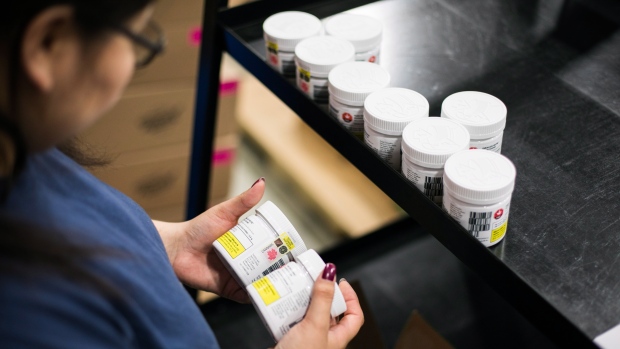Jan 4, 2019
Fingers crossed: Ontario pot retailers await fate in licence lottery

The next phase of Ontario’s retail cannabis rollout will unfold next week as the province holds a lottery to decide which companies will be granted one of 25 available store licences.
The licences come with a wave of regulations and conditions, including the potential of having to pay tens of thousands of dollars in fines if a successful company is unable to sell cannabis on April 1.
“It’s not been ideal, obviously, but it’s difficult to criticize too strongly, either, because we do have a supply issue,” Trina Fraser, a partner at Brazeau Seller specializing in cannabis law told BNN Bloomberg, said in a phone interview.
Under the terms of the lottery, companies must submit an expression of interest and a $75 fee for a chance to win one of the 25 available retail licences on Monday and Tuesday from the Alcohol & Gaming Commission of Ontario (AGCO). Those licences will then be divided between five defined regions in Friday's lottery: five to the city of Toronto, an additional six to the Greater Toronto Area, five to Ontario east (which includes Peterborough, Ottawa among others), two to Northern Ontario (including Sudbury and Thunder Bay) and seven to Western Ontario (including Hamilton, Niagara and Waterloo).
Winners would also need to produce a $50,000 letter of credit within five days of being selected and face potential fines for missing an opening date of April 1. Late fines start at $12,500, but could reach a total of $50,000 if a winning applicant doesn’t have its store open by April 30.
“I understand that the provincial government has made a commitment to stores opening as of April 1… but really they’re doing so kind of ass-backwards, as far as I’m concerned, by threatening them with pretty onerous penalties if they don’t,” said Fraser.
Fraser said these conditions favour larger retail operations.
“It’s definitely designed for larger operators who are prepared to go out on a limb and go ahead and spend significant amounts of money without knowing whether they’re one of the 25,” she said.
Fraser says many retailers may find it difficult to make that deadline as they deal with potential building permit delays as well as the Jan. 22 deadline for municipalities to opt out of cannabis sales.
“We’re not thinking through all the possible things that could go wrong here,” she said.
However, the head of one of Canada’s largest cannabis retailers is arguing for even higher penalties for retailers who fail to meet the April 1 deadline.
“I think there should be more severe penalties if you’re not open by April 30. In fact, I think you should have your licence revoked,” said National Access Cannabis (NAC) chief executive officer Mark Goliger in a phone interview with BNN Bloomberg.
The Ontario cannabis retail licences are extremely lucrative and Ontario’s proposed regulations and penalties will help ensure that the winning retailers have the necessary expertise to meet Ontario’s market needs, he said.
“Almost everyone in Ontario would be a willing retailer, if given the opportunity,” Goliger said. “With a finite number of stores and that number being ridiculously low [at] 25 – based on what will be the market demand for cannabis in a retail environment – anybody and everybody would want to own a store.”
NAC announced a retail partnership with coffee chain Second Cup in the spring of 2018 to convert some of its existing restaurants into cannabis stores. NAC currently operates six cannabis stores in Manitoba under its Meta brand and 14 in NewLeaf-branded locations in Alberta, making it Canada’s largest private cannabis retailer.
Ontario’s shifting retail Cannabis strategy has been costly for some would-be retailers. One interested retailer says the changing regulation has already cost his company thousands of dollars.
“We were just about to sign up a major compliance company and close a contract with them for $40,000 when the night before sending payment the AGCO changed the whole process!” Mark Francis, CEO of Toronto-based Herbalicious, told BNN Bloomberg via email.
“Now we are sitting on an empty location paying roughly $6,000 a month in rent and have had to change our model to simply send in an expression of interest in the hopes that we win the lottery.”
Expectations are mixed for what awaits the potential winners.
Fraser is telling clients to apply and cross their fingers.
“My advice will be: For the sake of $75, put the expression of interest in, have a discussion of which region or regions you’re going to apply for and see what happens.”
Goliger, meanwhile, only sees hype.
"I see it being a lot of noise,” he said. “A lot of people [have] thrown their hats into the ring and that is going to produce winners that have no ability to actually create a successful retail environment.”





